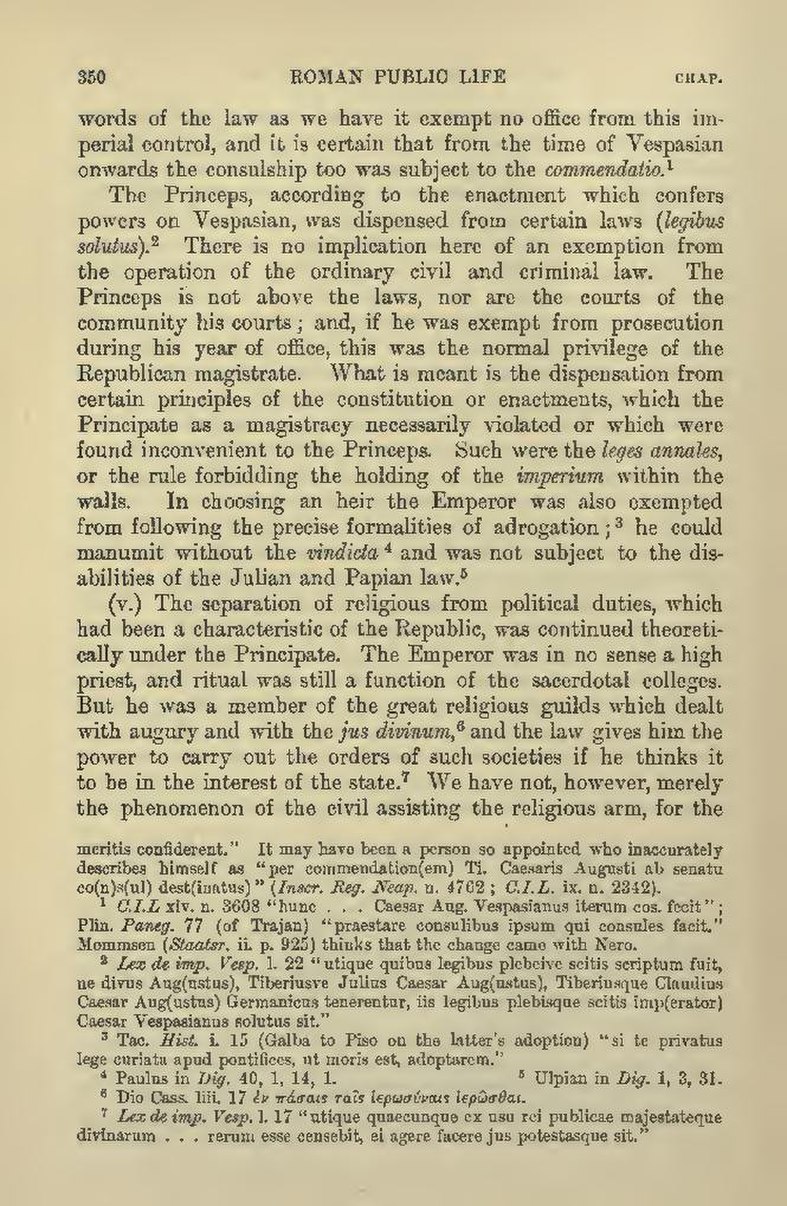words of the law as we have it exempt no office from this imperial control, and it is certain that from the time of Vespasian onwards the consulship too was subject to the commendatio.[1]
The Princeps, according to the enactment which confers powers on Vespasian, was dispensed from certain laws (legibus solutus).[2] There is no implication here of an exemption from the operation of the ordinary civil and criminal law. The Princeps is not above the laws, nor are the courts of the community his courts; and, if he was exempt from prosecution during his year of office, this was the normal privilege of the Republican magistrate. What is meant is the dispensation from certain principles of the constitution or enactments, which the Principate as a magistracy necessarily violated or which were found inconvenient to the Princeps. Such were the leges annales, or the rule forbidding the holding of the imperium within the walls. In choosing an heir the Emperor was also exempted from following the precise formalities of adrogation;[3] he could manumit without the vindicta[4] and was not subject to the disabilities of the Julian and Papian law.[5]
(v.) The separation of religious from political duties, which had been a characteristic of the Republic, was continued theoretically under the Principate. The Emperor was in no sense a high priest, and ritual was still a function of the sacerdotal colleges. But he was a member of the great religious guilds which dealt with augury and with the jus divinum,[6] and the law gives him the power to carry out the orders of such societies if he thinks it to be in the interest of the state.[7] We have not, however, merely the phenomenon of the civil assisting the religious arm, for the
- [Footnote: meritis confiderent." It may have been a person so appointed who inaccurately
describes himself as "per commendation(em) Ti. Caesaris Augusti ab senatu co(n)s(ul) dest(inatus)" (Inscr. Reg. Neap. n. 4762; C.I.L., ix. n. 2342).].]
- ↑ C.I.L xiv. n. 3608 "hunc . . . Caesar Aug. Vespasianus iterum cos. fecit"; Plin. Paneg. 77 (of Trajan) "praestare consulibus ipsum qui consules facit." Mommsen (Staatsr. ii. p. 925) thinks that the change came with Nero.
- ↑ Lex de imp. Vesp. l. 22 "utique quibus legibus plebeive scitis scriptum fuit, ne divus Aug(ustus), Tiberiusve Julius Caesar Aug(ustus), Tiberiusque Claudius Caesar Aug(ustus) Germanicus tenerentur, iis legibus plebisque scitis imp(erator) Caesar Vespasianus solutus sit."
- ↑ Tac. Hist. i. 15 (Galba to Piso on the latter's adoption) "si te privatus lege curiata apud pontifices, ut moris est, adoptarem."
- ↑ Paulus in Dig. 40, 1, 14, 1.
- ↑ Ulpian in Dig. 1, 3, 31.
- ↑ Dio Cass. liii. 17 [Greek: en pasais tais ierôsynais ierôsthai
- ↑ Lex de imp. Vesp. l. 17 "utique quaecunque ex usu rei publicae majestateque divinarum . . . rerum esse censebit, ei agere fecere jus potestasque sit."
